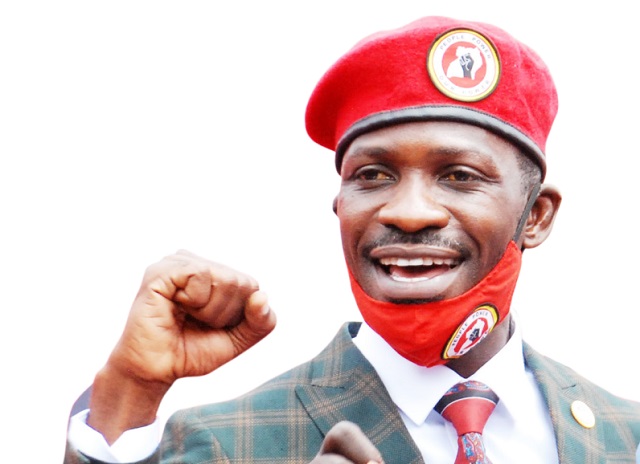
Kampala, Uganda | THE INDEPENDENT | Majority of the grounds, upon which Robert Kyagulanyi Ssentamu, the President of the National Unity Platform is seeking to overturn last month’s election results are a replica of a similar petition filed by Former Prime Minister Amama Mbabazi, five years ago.
The petition challenging the declaration of Yoweri Kaguta Museveni as the president-elect by the Electoral Commission listed 26 grounds to prove that Museveni was not validly declared winner of the January 14, election. However, it only introduces three new grounds upon which Kyagulanyi and his team are calling upon the highest court in the land to invalidate the results.
The other 23 grounds are either the same or similar in nature and character, of the 2016 petition which was filed by Mbabazi who had broken ranks with his former boss, Yoweri Museveni. Mbabazi also dragged Museveni to court together with the Electoral Commission and the Attorney General challenging the outcome of the election that had Museveni winning by 60 per cent against his closest rival Dr Kizza Besigye of the FDC who got 35 per cent of the total vote.
Mbabazi was pushed to the Supreme Court after Besigye who was most aggrieved was prevented from filing a similar petition when he was put under house arrest immediately after election day. In his petition that was filed on March 1, 2016, Mbabazi listed 28 reasons why the Supreme Court had to nullify the victory of President Museveni and order for a fresh election.
The key difference in the two petitions is the argument by Kyagulanyi that the Attorney General neglected or refused to amend or cause amendment to the relevant laws which would ensure a free and fair election as directed by the Supreme Court in the Mbabazi Presidential Election petition.
The other ground that is different is the claim that the Electoral Commission through a press statement dated December 26, 2020, arbitrarily, irrationally and indefinitely banned election campaign meetings in Kampala Jinja, Kabale, Kalungu, Masaka, Tororo, Luwero, Wakiso, Mukono, Buikwe, Buvuma, Mukono, Kayunga, Mbarara, Kabarole, Fort Portal City, Kasese and Kazo. According to Kyagulanyi, this frustrated his right to associate, assemble and interface with the electorate.
Like Mbabazi, Kyagulanyi complains about the use of the UPDF and the Police to harass, arrest or interfere with the election. Both petitions accuse Museveni of using foul language against his opponents, intimidating opponents, directing the Electoral Commission to do his bidding, bribing voters among others. The issue of ballot stuffing, multiple voting, disfranchisement of voters, intimidating polling agents among others, are also very prominent in both petitions.
On the other hand, the difference that Mbabazi’s petition had from that of Kyagulanyi was the claim that Museveni was nominated by the Electoral Commission illegally on November 3, 2015, when he had not yet been sponsored by the National Resistance Movement on whose ticket he purportedly contested.
Mbabazi also claimed that the Electoral Commission acted improperly when it extended the deadline to give Museveni more time instead of declaring his nomination papers null and void after the deadline had passed and after all other candidates had submitted their respective documents thereby giving him an unfair advantage.
Mbabazi’s petition also blamed the Electoral Commission for failure to accord equal treatment to candidates when it failed to prevail upon authorities and agencies of government such as the Uganda Broadcasting Corporation and the New Vision Printing and Publishing Corporation through their electronic and print media to render equal coverage to him to enable him to present his programmes yet they offered preferential treatment to Museveni.
Mbabazi also blamed Museveni for directing then Major General Henry Tumukunde to fly his helicopter fully decorated with his campaign posters and party colours to land at Boma Ground Fort Portal and in effect interfering with Mbabazi’s scheduled activities.
But the Supreme Court that was presided over by a Coram of nine judges unanimously dismissed the petition without allowing any of the prayers that Mbabazi had sought from the Kololo based court. Of the nine Judges who are most likely going to determine the petition, five of them also took part in the Mbabazi petition. These include Dr Esther Kisaakye, Stella Arach Amoko, Rubby Opio-Aweri, Faith Mwondha and Prof. Lillian Tibatemwa-Ekirikubinza.
Other Justices who heard the Mbabazi petition but have since retired include Bart Katureebe, Jotham Tumwesigye, Augustine Nshimye Ssebuturo and Eldad Mwangusya. These have been since replaced by Alphonso Owinyi-Dollo, Paul Mugamba, Mike Chibita, Ezekiel Muhagunzi and Percy Tuhaise.
In 2001 and 2006, Dr Kiiza Besigye of Reform Agenda and Forum for Democratic Change respectively dragged the Electoral Commission and President Museveni to the Supreme Court over what he called a fraudulent election. According to the 2017 amendment of article 104 (b), the Supreme Court has up to 45 days to hear and determine the petition.
********
URN
 The Independent Uganda: You get the Truth we Pay the Price
The Independent Uganda: You get the Truth we Pay the Price



